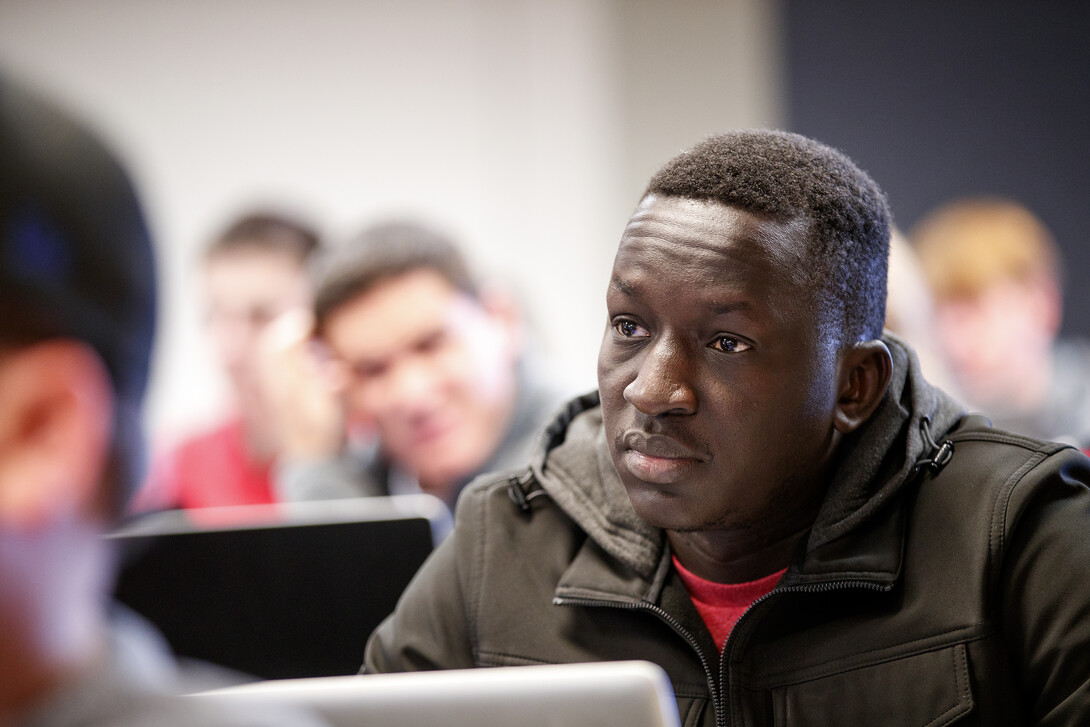
Gatluak Ramdiet was 9 years old, playing in the Nile River as he did many days, when the gunshots rang out. He and his brother dodged bullets as they ran.
Ramdiet’s family was somewhat accustomed to violence, as civil war had been raging in Sudan for more than a decade, but now the militias were ambushing their village. Homes, crops and livestock were all burned or stolen.
“Everything was destroyed, and things were so bad, my parents had to leave to find food,” Ramdiet said. “They decided that it was time for my brother and I to go to a refugee camp, and arranged for some family friends to take us.”
The small group joined a larger group heading east to a United Nations refugee camp in Ethiopia. Ramdiet’s parents and two younger sisters, who likely could not survive the journey, stayed behind.
“We walked a whole week, and we had to walk mostly at night because it was a lot safer,” he said. “During the day, we would find shelter or find someone who was willing to welcome us in and wait there until the sun went down.”
Once at the camp, Ramdiet was reunited with his eldest brother and his new sister-in-law.
Food was scarce, and there was work to be done — Ramdiet and others would spend more than six hours a day walking to gather firewood to sell and trade for extra food and supplies, but he was still relieved to be in the camp.
“It was a struggle, but it was much safer,” Ramdiet said. “The first night after that journey, in the camp, I felt great relief. I remember sleeping well that night because I felt safe.”
It was also the first time Ramdiet had access to education.
“Unfortunately, we could only go for an hour twice a week, but I was glad to be learning,” he said.
These opportunities had changed Ramdiet’s life, and he developed much respect for the U.N. workers at the camp and the programs that were assisting he and his brother, including the World Food Program and UNICEF.
“All the people on the ground at these refugee camps are true heroes,” he said. “They made me want to join the U.N. when I grew up. There is no more noble cause.”
Resettling in Nebraska
His eldest brother had applied for resettlement before Ramdiet arrived at the camp, and he petitioned for guardianship of his two younger brothers in order to be resettled together. Still, the family spent six years in the camp. Ramdiet recalls a years-long process of interviews, background checks and medical checks while awaiting resettlement. Finally, in 2006, they received word they would be resettling in the United States, with the aid of Lutheran Family Services.
“They gave us only a few days to pack our stuff,” Ramdiet said. “It was a really, really long process, and then suddenly, we had plane tickets and we were going.”
After a layover in New York City, they arrived in Omaha on March 26, 2006.
“The first thing we noticed was how cold it was,” Ramdiet recalled with a laugh. “But everything just amazed me, it was completely new.”
With rudimentary English skills, and very little previous schooling, their transition in the U.S. wasn’t easy. Now 15, Ramdiet enrolled at Omaha South High School as a freshman.
“I was perfecting my ABCs as a ninth-grader, but this was something I had felt deprived of so I just never stopped.” Ramdiet said. “I was starved for knowledge. Learning to read opened up this whole new world.”
Ramdiet said his family was lucky to have teachers and mentors and their South Sudanese community to help them establish lives in Omaha. The brothers were also able to locate their family in Ethiopia and traveled there to visit in 2014.
New York calling
Ramdiet eventually earned his bachelor’s degree from the University of Nebraska at Omaha, and enrolled in the College of Law at the University of Nebraska-Lincoln in 2016.
Ramdiet’s life came full circle while studying criminal and international law. Right away, he applied for an internship with the U.N., and wasn’t selected. The rejection stung, but an International Human Rights Seminar with Brian Lepard, Harold W. Conroy Distinguished Professor of Law, convinced him to try again. This time, Ramdiet had more knowledge about the U.N. and was able to better articulate what he could bring to and gain from the experience.
Ramdiet was selected for an internship with the U.N.’s Office of Legal Affairs, thanks in part to the mentorship of Lepard and Eric Berger, associate dean for faculty and professor of law.

Ramdiet spent the summer of 2018 in New York working for the U.N., assisting with projects that exposed him to both international and domestic law. He also met the U.N. Secretary General who was the head of the refugee agency when Ramdiet was in the camp.
“I was able to introduce myself and talk with him a little bit about my experience, which was amazing,” he said. “The whole experience was a dream come true.”
While Nebraska will always be home, he said, he found that New York City suited him, too. He will be an assistant district attorney in New York City after he graduates in May and passes the bar exam in July.
“My background is that of chaos, and that was caused by the absence of the rule of law,” Ramdiet said. “Those people in Sudan who burned our village and others still have not been prosecuted by anyone and that is something I live with every day because it changed my life.
“If I can be in a position to help somebody, to help a kid like me get some justice when a wrong has been done, that gives my life some purpose.”







